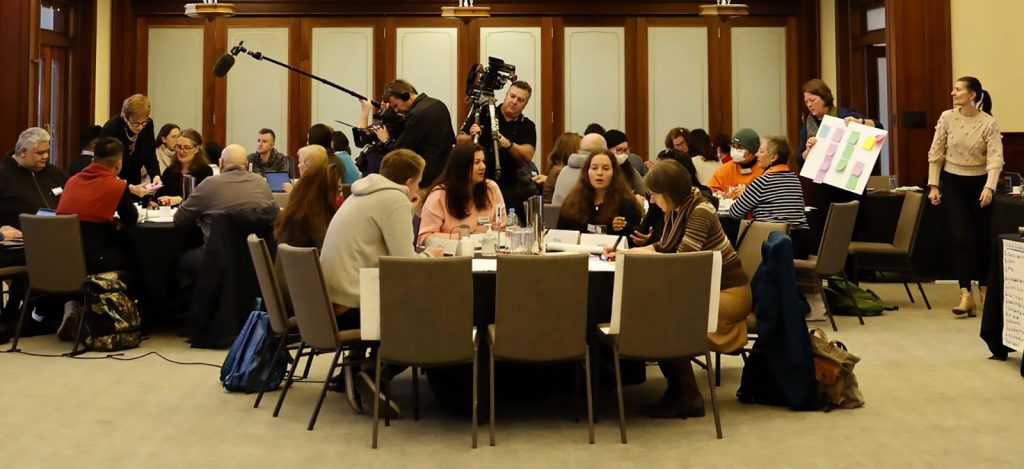The threat of sanctions or coercive power is key to how governments make public good outcomes. To increase the legitimacy of coercive power and address illegitimate forms of power such as control and corruption, Anne Nygaard Jedzini argues that politicians need to share power with citizens through deliberation
The sharing of power between politicians and citizens is relevant and important in today’s fractured political environment. Yet the idea is contested, because it challenges the underlying premise of representative politics.
Politicians, however, are not new to involving members of the public in experimental ways to influence public policy. For more than 20 years, governments across OECD countries have been trialling democratic innovations to increase trust and legitimacy in political decisions. They have done this by including relevant and/or representative societal stakeholders, such as citizens, in the development of policy decisions. Despite the successes of democratic innovations, they continue, in most cases, to lack binding decision-making power. This means that such innovations often are used merely to legitimise existing policy agendas or for political cherry-picking purposes.
I propose we focus on how politicians can share deliberative power with citizens to increase the legitimacy of coercive power
In the face of this frustration, there are calls to give decision-making power back to the public. But convincing politicians to relinquish decision-making power is difficult. And removing politicians altogether would overlook the importance of government regulation, for example through tax, health and education to make public good outcomes. Coercive power is a necessity for a well-functioning democracy. However, coercive power also pervades peoples’ choice and style of communication – even in democratic innovations.
Inequality is inevitable in deliberations with or without politicians. The focus has thus traditionally been on how to mitigate coercive power in design features of democratic innovations. I propose we should focus instead on how politicians can share deliberative power with citizens to increase the legitimacy of coercive power.
Democratic innovations aim to deepen citizens’ participation and engagement in political decision-making. These deliberative and participatory processes seek to inform politicians.

Such communication typically happens via recommendations developed by the forum of citizens selected to deliberate on a specific policy issue. Politicians gain valuable insights into a particular issue from the lived experience of citizens. Citizens, in turn, feel empowered by their ability to influence political decisions. Yet despite OECD countries' rapid uptake of democratic innovations in government, politicians remain reluctant to fully adopt the recommendations that arise from citizens’ deliberations.
Politicians' unresponsiveness to citizen recommendations has sparked discussion about the delegation of formal powers to democratic innovations
Much research shows that politicians are sceptical of sharing power with citizens. Their scepticism is usually based on the notion that sharing power involves giving up some of their power. Power in democratic innovations has become a zero-sum game in which those in power remain powerful while those without power remain powerless.
Furthermore, politicians’ reluctance to share power means that power becomes more centralised. This delegitimises governments’ coercive power. Centralised power also allows for illegitimate forms of power to emerge, and to manifest institutionally in controlling or corrupt behaviour. Checks and balances are supposed to address and prevent illegitimate forms of power, but centralised power weakens them.
The public’s disillusion with politicians’ role as sovereign policymakers is a challenge for democracies around the world. Sovereign policymaking fosters elitism and professionalism among politicians. Politicians hence become less representative of the wider population, calling into question their democratic legitimacy.
Moreover, sovereign governance will not solve the wicked problems the world currently faces. Sovereign policymakers cannot solve democratic decline, climate catastrophe and economic inequality. These problems require systematic inclusion, collaboration and deliberation in and across government and society. What is evident from democratic innovations, though, is that the great virtues of deliberation are not enough.
Shared decision-making power in democratic innovations exists at local government level. Copenhagen City Council, for example, is the most recent OECD local government to introduce a permanent citizens' forum through which to share decision-making power with communities. This shows that at least some politicians are interested in exploring avenues for sharing elements of their decision-making power.
Of course, power sharing still risks perpetuating existing power inequalities. Politicians and citizens must thus identify and confront their own cognitive and communicative biases that go beyond deliberation itself. Only then will politicians and citizens come together on equal terms through shared deliberation.
The sharing of deliberative power between politicians and citizens is a pragmatic approach to addressing some of the deep rifts challenging our democracies
Distributing decision-making power across government and wider society can create greater democratic accountability because citizens carry some of politicians' authority and responsibility. Shared decision-making power also increases the legitimacy of the coercive power governments need to create laws and legislation for citizens to live prosperous lives.
Politicians' sharing of decision-making power with citizens also prevents illegitimate forms of power taking root. Power would not be centralised with a few elitist politicians, but with non-elected people of different lived experiences and worldviews.
Shared deliberative power is not a magic solution for all countries and political contexts. It is a vision of a combined representative and deliberative democracy where power is widely distributed through deliberation. What deliberative power offers is a route to (re)connect politicians and citizens with each other at a time when shared decision-making has never been more important.